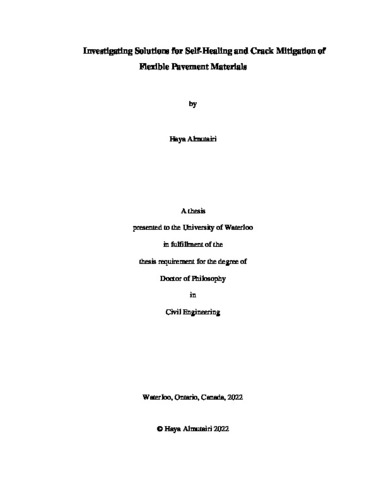| dc.description.abstract | In Canada, cracking is the most common deterioration mode of flexible pavements that occurs for different reasons such as traffic loading, and low temperature. Moreover, the propagation of cracks can be accelerated by the oxidation of the asphalt. In this study, innovative new solutions to improve the self-healing of asphalt materials and extend the service life of pavements were investigated. This research involves investigating the self-healing behavior of both Hot Mix Asphalt (HMA) modified with aramid fibres and asphalt cement modified with Polymers, Glass Powder (GP), Phase-Change Materials (PCM).
For the HMA modified mixtures with aramid fibres with different dosages and lengths of 110 g/tonne, 138 g/tonne and 164 g/tonne; and 13, 20, 25mm, respectively, rutting, fatigue, and low-temperature cracking tests were used to assess the feasibility of these fibres to improve the healing capacity. It was found that there was no positive impact of using these fibres as a reinforcement of the asphalt mixture; therefore, the self-healing behavior of these mixtures could not be evaluated.
As for the asphalt binder evaluation, a laboratory study on the rheological, spectroscopic, and chemical characterization of asphalt binders modified with Polymers, GP and PCM was conducted. Different binders, which are Control, PG 70-28, 5%PCM, 5%GPCM, 7%GPCM, 5% GPCM-SBS and 7% GPCM-SBS binders were assessed using Differential Scanning Calorimetry (DSC), Thermogravimetric Analyzer (TGA) Fourier Transforms Infrared Spectroscopy (FTIR), Viscometer, Dynamic Shear Rheometer (DSR) and Environmental Scanning Electron Microscopy (ESEM). The results showed that the degradation temperature for the PCM was low; therefore, the PCM cannot be used in HMA. In addition, modified binders with PCM and GPCM showed a low viscos behavior compared to the control binder. The DSR rheological analysis showed that the Control binder and 5%PCM, 5%GPCM, 7%GPCM, 5%GPCM-SBS and 7%GPCM-SBS binders had a similar overall property. However, the addition of GPCM significantly decreases the stiffness at intermediate temperatures.
Moreover, the DSR was used to investigate the self-healing and fatigue resistance properties of asphalt binders. Two different types of binders, PG 58-28 and PG 70-28, were modified with GP and GPCM and evaluated. Three different percentages of GP and GPCM of 3.5%, 5% and 7% by weight of the binder were considered. The LAS test was conducted with/without rest period (5-min or 30-min) to measure the healing index and fatigue behavior of the asphalt binders. The binders were evaluated based on its fatigue resistance and healing capacity. The Linear Amplitude Sweep (LAS) and Pure Linear Amplitude Sweep (PLAS) were used to evaluate the fatigue resistance; whereas the self-healing capacity was assessed using Pure Linear Amplitude Sweep Healing (PLASH). The evaluation using LAS and PLAS methods demonstrated that the addition of GP does not improve the fatigue resistance of the binders in both; however, the highest fatigue resistance was reported with the addition of 7%GPCM. It was noticed that a small improvement in the self-healing ability when a 5-min rest period is introduced. Finally, the healing capacity of asphalt binders was significantly improved when a longer rest period was introduced. | en |

